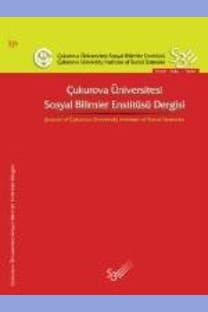TÜKETİM DEĞERLERİ, SATIN ALMA NİYETİ VE SATIN ALMA DAVRANIŞI ARASINDAKİ İLİŞKİLERİN İNCELENMESİ: FONKSİYONEL GIDALAR ÜZERİNE BİR ÇALIŞMA
Fonksiyonel gıda, tüketim değerleri, satın alma niyeti, satın alma davranışı
___
- Ajzen, I. (1991). The Theory of Planned Behaviour. Organizational Behaviour and Human Decision Processes, 50, 179-211. Anamaria, M. (2015). Consumer Behaviour and Attitudes toward Functional Foods. Alimntarăvol. 14 B, 335-340. Annunziata, A., Pascale, P. (2009). Consumers’ Behaviours and Attitudes toward Healthy Food Products: The Case of Organic and Functional Foods. 113th Eaae Seminar ‘‘A Resilient European Food Industry and Food Chain in A Challenging World”, ,1-14, Chania, Crete, Greece. Annunziata, A., Vecchio, R. (2011). Functional Foods Development in the European Market: A Consumer Perspective. Journal of Functional Foods, 3(3), 223–228. Beyzavi, M., Lotfizadeh, F. (2014). Analysing the Choice Behaviour Based on the Theory of Consumption Values for Green Products in Iran. Kuwait Chapter of Arabian Journal of Business and Management Review, 3(12), 124-134. El, S., Simşek, S. (2011). Food Technological Applications for Optimal Nutrition: An Overview of Opportunities for the Food Industry. Comprehensive Review in Food Science and Food Safety, 11(1), 2-13. Gray, J., Armstrong, G., Farley, H. (2003). Opportunities and Constraints in the Functional Food Market. Nutrition & Food Science, 33 (5), 213-218. Gugkang, A.S.,Sondoh, S.L., Tanakinjal, G.H., (2014). Consumption Values, Environmental Concern, Attitude and Purchase Intention in the Context of Green Products 2013-2014. IJGMSP. 74, 5(1), 73-92. Hair, J. F., Black W. C., Babin B. J. ve Anderson R. E. (2010). Multivariate Data Analysis, A Global Perspective (7. Basım), NJ: Pearson. Hardy, G. (2000). Nutraceuticals and Functional Foods: Introduction and Meaning. Nutrition, 16, 688–697. Hill R.R. (1998). Analytical Comparison of Optimization Problem Generation Methodologies. Proceedings of 30th Conference on Winter Simulation. 609- 616. Hsieh, H.Y. (2016). The Relationship among Consumer Value, Brand Image, Perceived Value and Purchase Intention-A Case of Tea Chain Store in Tainan City. Proceedings of the Eighth Asia-Pacific Conference on Global Business, Economics, Finance and Banking (Ap16singapore Conference). ISBN: 978-1-943579-07-5 1-10. Irene Goetzke, B., & Spiller, A. (2014). Health-Improving Lifestyles of Organic and Functional Food Consumers. British Food Journal, 116(3), 510-526. Jıang, S. (2016). Purchase Intention for Electric Vehicles in China from a Customer-Value Perspective. Social Behaviour and Personality: An International Journal, 44(4), 641-656. Kljusurić, J.G, Čačić, J. (2008). Changes of Young Consumers’ Perception Regarding Functional Food-Case of Croatıa. Journal of Hygienic Engineering and Design. UDC 336.14-053.6:613.2, 61-65. Krystallis, A., Maglaras, G., & Mamalis, S. (2008). Motivations and Cognitive Structures of Consumers in Their Purchasing of Functional Foods. Food Quality and Preference, 19(6), 525-538. Kubomara, K. (1998). Japan Redefines Functional Foods. Prepared Foods, 167, 129–132. Lin, P. C., & Huang, Y. H. (2012). The Influence Factors on Choice Behaviour Regarding Green Products Based on the Theory of Consumption Values. Journal of Cleaner Production, 22(1), 11-18. Maccallum, R. C., Widaman, K. F., Zhang, S., Hong, S. (1999). Sample Size in Factor Analysis, Psychological Methods, 3, 84-99. Martirosyan, D. M., Singh, J. (2015). A New Definition of Functional Foods By Ffc: What Makes A New Definition Unique? Functional Foods in Health and Disease, 5(6), 209–223. Menrad, K. (2003). Market and Marketing of Functional Food in Europe. Journal of Food Engineering, 56(2), 181-188. Roberfroid, M. (2002). Global View on Functional Foods: European Perspectives. British Journal of Nutrition, 88(S2), 133-138.
- Siro, I., Kapolna, E., Kapolna, B., & Lugasi, A. (2008). Functional Food. Product Development, Marketing and Consumer Acceptanceda Review. Appetite, 51(3), 456-467. Sheth, J., Newman, B., Gross, B. (1991). Why We Buy What We Buy: A Theory of Consumption Values. Journal of Business Research, 22(2), 159-170. Shıh, E., Wang, T. (2010). Impact of Multiple Perceived Value on Consumers’ Brand Preference and Purchase Intention: A Case of Snack Foods. Journal of Food Products Marketing, 16, 386–397. Sweeney, J., Soutar, G. (2001). Consumer Perceived Value: The Development of a Multiple Item Scale. Journal of Retailing, 77(2), 203-220. Tobin, J. (1959). On The Predictive Value of Consumer Intentions and Attitudes. The Review of Economics and Statistics, 41(1), 1-11. Wan, C., Cheung, R., Shen, G.Q. (2012). Recycling Attitude and Behaviour in University Campus: A Case Study in Hong Kong. Facilities 30 (13/14), 630–646. Wee, C.S., Ariff, M. S, Zakuan, N., Tajudin, M. N, Ismail, K., Ishak, N. (2014). Consumers Perception, Purchase Intention and Actual Purchase Behavior of Organic Food Products. Review of Integrative Business and Economics Research, 3(2) 378-397. Xiao, G., Jai-Ok K. (2009). The Investigation of Chinese Consumer Values, Consumption Values, Life Satisfaction and Consumption Behaviours. Psychology & Marketing, 26(7), 610–624. Yadav A, R., Pathak, G.S. (2017). Determinants of Consumers' Green Purchase Behaviour in a Developing Nation: Applying and Extending the Theory of Planned Behaviour. Ecological Economics, 134, 114–122. Yaşin, B. (2007). Tüketicilerin Alışveriş Stilleri ile Tüketim Değerleri Arasındaki İlişkinin Belirlenmesine Yönelik Bir Araştırma. (Doktora Tezi), İstanbul Üniversitesi Sosyal Bilimler Enstitüsü, İstanbul. Yoo , J., Divita, L., Kim, H.Y. (2013). Environmental Awareness on Bamboo Product Purchase Intentions: Do Consumption Values Impact Green Consumption?, International Journal of Fashion Design, Technology And Education, 6(1), 27-34.
- ISSN: 1304-8880
- Yayın Aralığı: 2
- Başlangıç: 2013
- Yayıncı: Çukurova Üniversitesi Sosyal Bilimler Enstitüsü Dergisi
TÜRKİYE’DE KADIN İŞGÜCÜNE KATILIMINI ETKİLEYEN FAKTÖRLER: ADANA İLİ ÜZERİNE BİR UYGULAMA
ÇOKLU İÇ İLİŞKİ SORUNU OLAN REGRESYON MODELİNİN HKO ÖLÇÜTÜ İLE BİR ETKİN TAHMİN EDİCİSİ
H. Altan Çabuk, Sibel Örk Özel
Fatma Demirci Orel, Merve Bozdemir, Naz Demirkılıç
Neslihan COŞKUN KARADAĞ, Ahmet İNNECİ
Kalender Özcan ATILGAN, Talip İNCE, Sinan YILMAZ
İÇ MEKAN TASARIMINDA RENK ARMONİSİ
Gamze Vural, Halil İbrahim Uçar
İNGİLİZCE EV ÖDEVLERİNE YÖNELİK ÖĞRETMEN GÖRÜŞLERİ
İşıl SÖNMEZ EKTEM, Sanem Büşra YILDIZ
Ayten Pınar Bal, Ahmet Karacaoğlu
